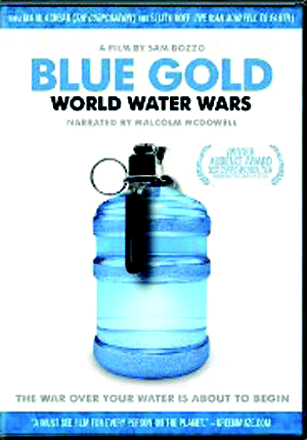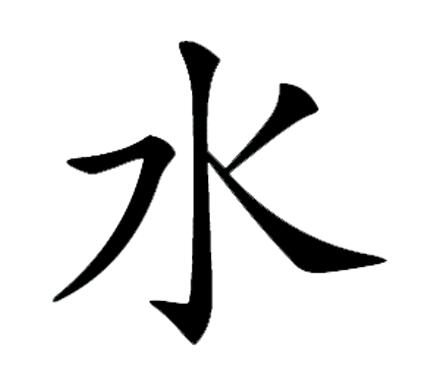Heated Water-Cooler Talk
- Dan Collinge, BA

Blue Gold: World Water Wars Director: Sam Bozzo Number of discs: 1 Rating: Unrated Studio: PBS Direct 2009. 90 minutes. $24.99
H2O. Chances are it was the first molecule you learned about in grade school (in fact, it was probably the molecule used to explain the concept of molecules), and it’s likely, too, that it was a key material in your first science fair experiment. It’s kid stuff. After all, what could be simpler than the water cycle? It rains; water collects in streams and lakes; rivers reach the oceans; water evaporates, forms clouds, slams into landmasses; it rains. And on and on and on until the end of time. Or maybe not. I’ll get to that. But first, here’s a new experiment to try: Next time your officemates cluster around the water cooler to talk about American Idol, interrupt them. Say, “Did you know it takes five five-gallon jugs to grow just one apple?” (Blank stares.) Or how about, “275,132 jugs to raise a steer for slaughter?”1 (Shrugs.) As your co-workers turn to walk away, explain to them that we cannot afford global agribusiness that is so wasteful with water, that we must not allow the privatization of water rights to continue, that we are running out of it, that we may be headed to war! If anyone asks you to calm down and lower your voice, just tell them to watch Blue Gold: World Water Wars.
Blue Gold is the kind of documentary that will make you very angry, which is to say that it does its job, which is also to say that it isn’t March of the Penguins. There’s not much to “like” about Blue Gold, although it’s well done. It’s a Michael Moore movie without Michael Moore; it’s An Inconvenient Truth, except whereas climate change science has unfortunately become nearly inextricable from politics, the filmmakers and talking heads go to great lengths here to stress that water rights are fundamental and therefore should be non-partisan. Blue Gold, ultimately, is a scorching rebuke of the privatization and corporatization of water rights and a populist appeal for grassroots movements to stop it.
The film is loosely based on the book Blue Gold: The Fight to Stop the Corporate Theft of the World’s Water by Maude Barlow and Tony Clarke (New Press, 2003). Barlow and Clarke are interviewed extensively in Bozzo’s documentary. Many other water rights advocates also appear, most notably Vandana Shiva, author of Water Wars: Privatization, Pollution, and Profit (South End Press, 2002). The interviews are spliced with news footage, B-roll of lakes, rivers, and streams (some beautiful, some decidedly not so), stylish graphics, cartoons, old movie clips, and satellite images. British actor Malcolm McDowell (A Clockwork Orange) narrates. All told, it’s an impressive package. There’s even a website (http://www.bluegold-worldwaterwars.com/) with up-to-date water news, contact information, and steps to get involved in “taking control of your water.”
There are four sections to Blue Gold the first three (“The Crisis,” “The Politics,” and “The Water Wars”) get increasingly bleaker. The final section, “The Way Forward,” then attempts to offset the panic and depression imparted by the rest of the film. The crisis, we learn, is that the water cycle, so easily grasped in grade school Earth Science, is not in reality quite the perfect circle that it is in the textbook. Of all the H2O on the planet, only 3% is freshwater, and even less than that is drinkable. This paltry amount has sustained life on Earth for quite some time, but it is running out, drying up. How? Isn’t it renewable? Not completely. We are draining groundwater from vast aquifers far faster than it can be replenished. We are doing this because the population can’t seem to stop itself from growing; because homes in Phoenix must have English-style grassy lawns; because it’s cheaper to grow apples, roses, and cotton in parts of the world where there isn’t enough water to do it; and because, in the end, it’s water, so what’s the big deal? The big deal is that by depleting the aquifers and diverting the rivers, we begin to create more deserts (water runs off the hard ground and quickly goes into the sea where it’s of no use).2 People can’t live without H2O (once again, thanks, grade school), nor can they live by drinking the polluted, stagnant muck of a diverted and dried river bed.
But thank goodness for capitalism! Giant corporations will save those parched and suffering souls in developing countries by selling them their own water back to them at prices they can’t afford (but in plastic bottles!). Rather than naming names, which the film, of course, does, suffice it to say some of the brand names we enjoy at home are not viewed so highly in parts of the developing world. But bottled water is only a small piece of it. Huge multinational corporations, aided by huge multinational trade organizations, have come to own the rights to entire cities’, states’, and even countries’ water systems. (Hint: this is “The Politics” section.) Although the privatization of water dates back for quite some time centuries in France the tipping point may have occurred in 1992 when the UN declared water an “economic good.” It’s the goal of Barlow, Clarke, and Bozzo to have water reclassified as a “need.” At one point in the film, Barlow says, “water privatization is the new colonialism.” Yikes! Meanwhile, water investors are drooling, lining up to make scads of money from it in the next century. Or, as one opportunist is quoted, “water is the hottest property out there.” Or, if it isn’t clear by now from the title of the film and the book, water is the new oil blue gold instead of black.
This is when the water wars begin. When investors and companies buy water in parts of the world where they don’t live, when people can’t access or can’t afford the water in the parts of the world where they do live, conflict is inevitable. The filmmakers would like you to keep in mind that the Chinese character for “water” is also the character for “control.” Also, the word “rival” comes from the Latin rīvalīs, meaning, roughly, “those who share the same river.” And if those innuendos aren’t enough, here’s a sobering thought from former World Bank Vice President Ismail Serageldin: “If the wars of this century were fought over oil, the wars of the next century will be fought over water.”

There is, however, a way forward, the film concludes. Its final section offers some familiar suggestions on how to conserve water turn off the taps, take shorter showers but it also proposes a few more novel actions, such as digging catchments in the ground to replenish aquifers, eating hydroponic and local produce, paving city streets with water-permeable materials, using water-saving two button toilets (one button for...I think you get the idea), and, above all else, becoming angry and involved. I suppose these measures do indeed mark ways forward, but the solutions don’t seem commensurate with the scale of the problem the film works so hard to illustrate. This slight letdown may not be the filmmakers’ fault; the odds simply may be stacked against them.
One final question: Is the film even-handed, is it “fair?” Perhaps not. Do the bad guys come across looking bad? You bet. A few spokespeople were brave enough to agree to face the cameras, but they all appear to suffer from the same case of foot-in-mouth disease, so it’s hard to feel too sorry for them. I would argue that none of this really matters in the end. The film’s a polemic, no doubt about it, and it carries through its argument with unapologetic efficiency. Blue Gold is thought-provoking, engaging, and frequently more than a little enraging.
So if you’re the experimenting type, and you want to stir up a little controversy around the water cooler, look no further than the H2O so basic, so familiar, so utterly complex.
Footnotes
- Copyright © 2010



